Unit 7 Will people have robots? Section A (1a-2d)课件(39张PPT)+嵌入音频
文档属性
| 名称 | Unit 7 Will people have robots? Section A (1a-2d)课件(39张PPT)+嵌入音频 |
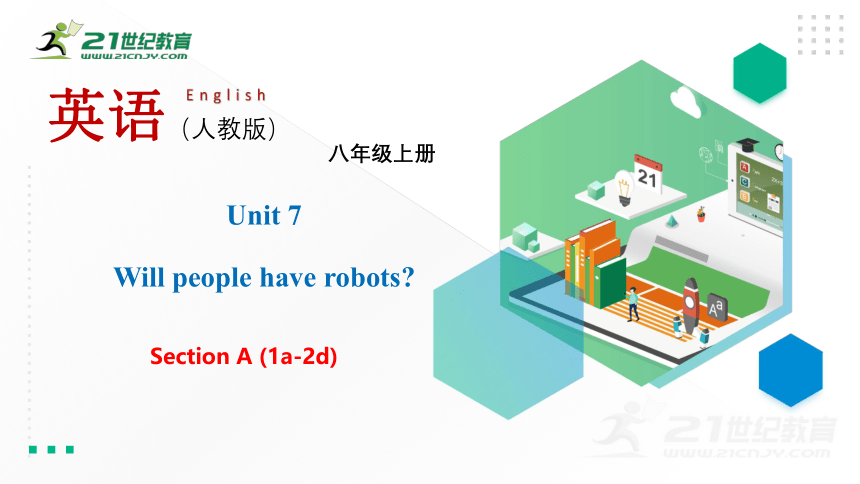
|
|
| 格式 | pptx | ||
| 文件大小 | 23.7MB | ||
| 资源类型 | 试卷 | ||
| 版本资源 | 人教新目标(Go for it)版 | ||
| 科目 | 英语 | ||
| 更新时间 | 2022-10-24 00:00:00 | ||
图片预览

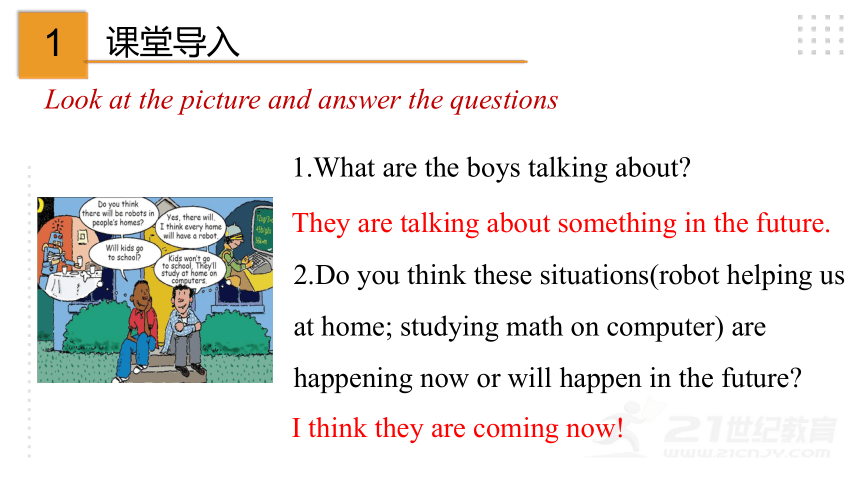
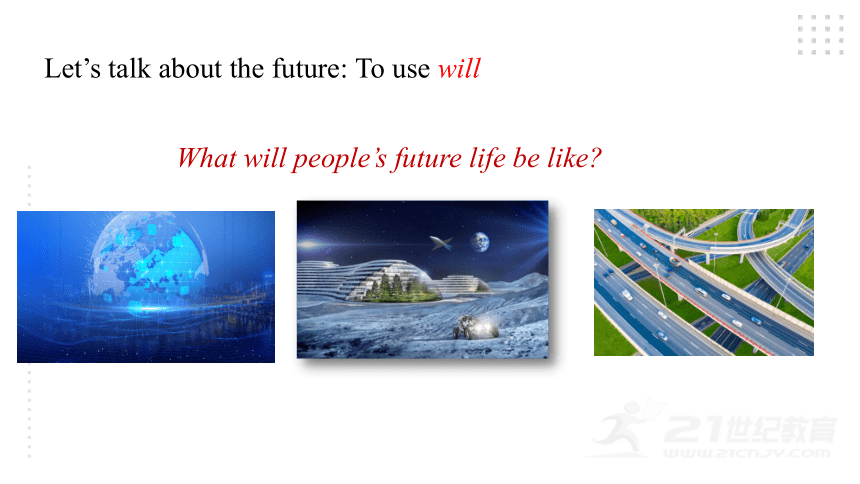
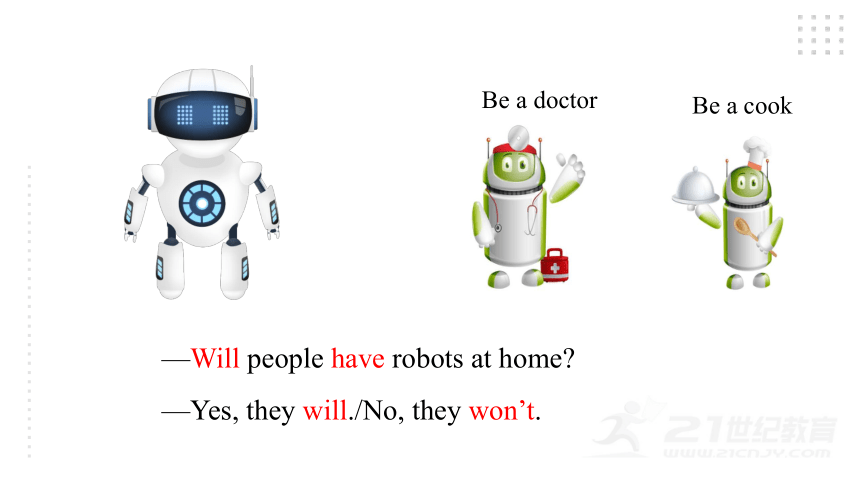
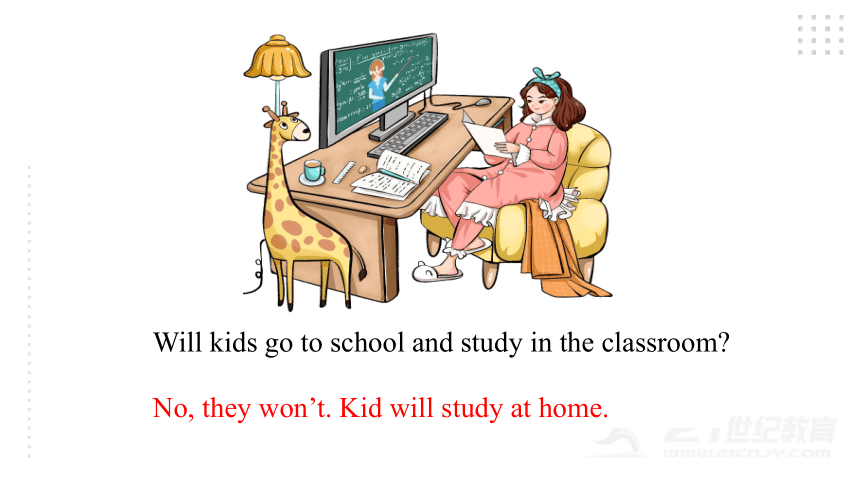
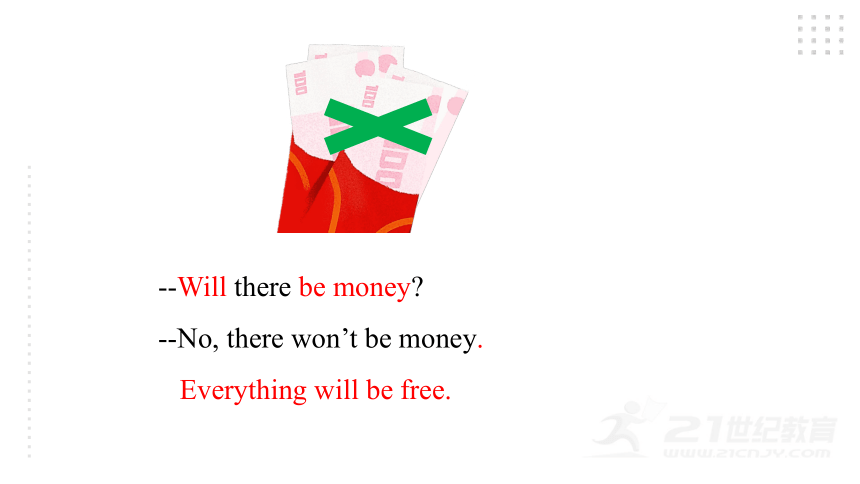
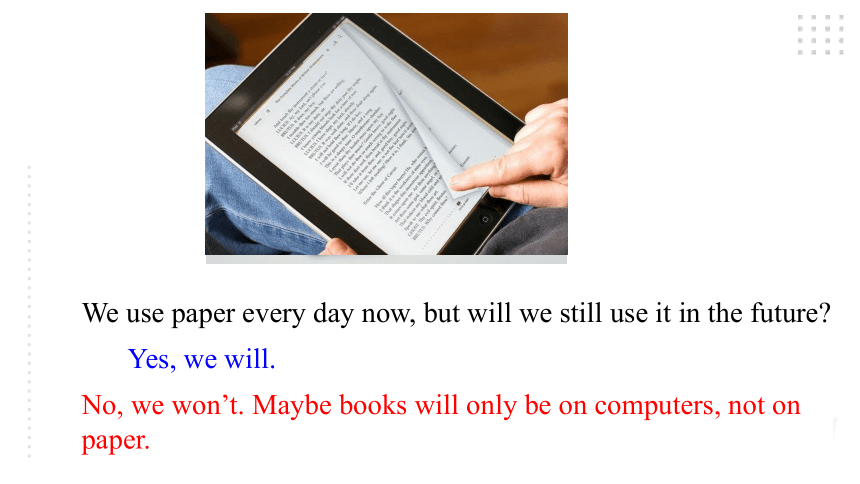
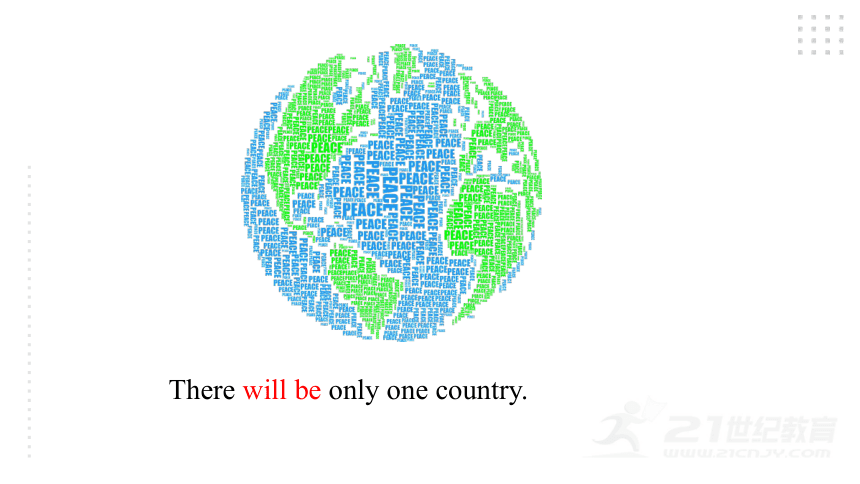
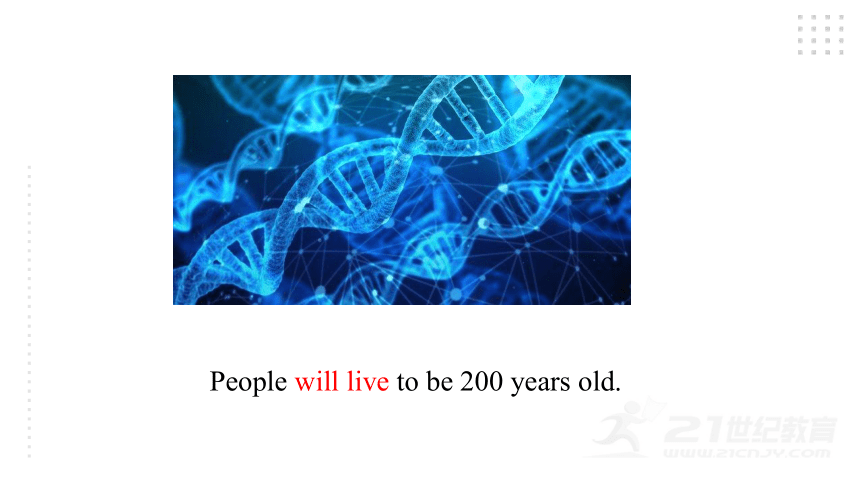
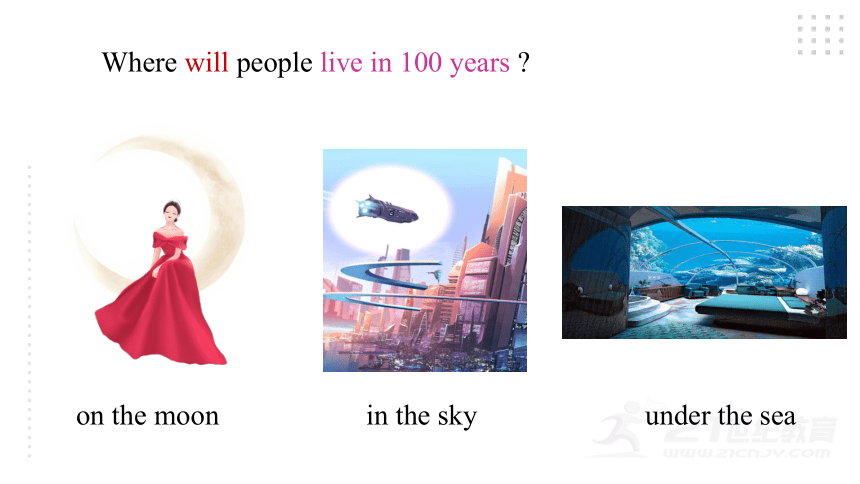
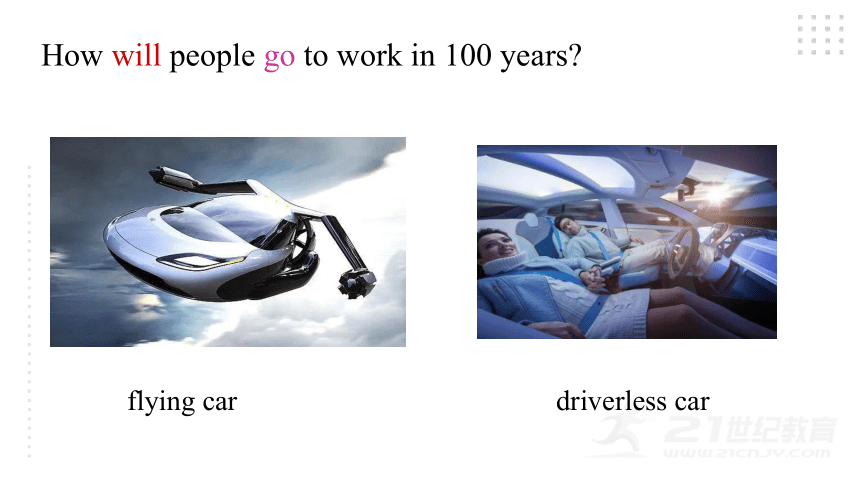
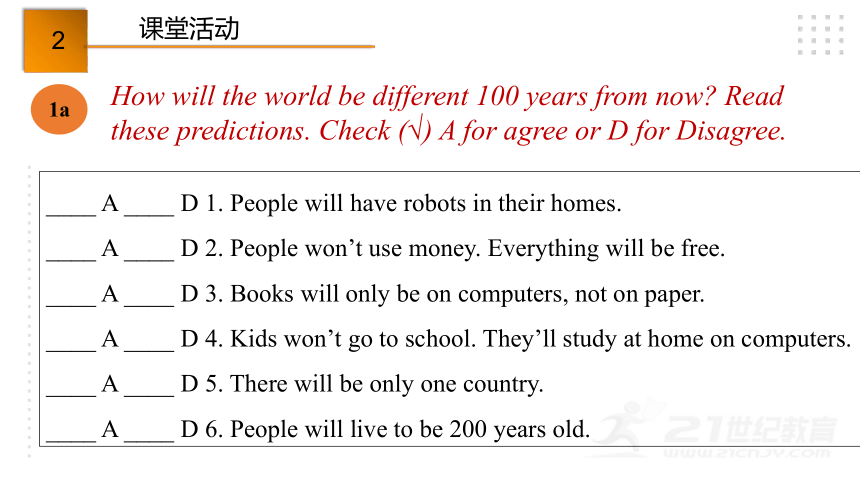
文档简介
(共39张PPT)
英语(人教版)
八年级上册
English
Unit 7
Will people have robots
Section A (1a-2d)
1.What are the boys talking about
Look at the picture and answer the questions
2.Do you think these situations(robot helping us at home; studying math on computer) are happening now or will happen in the future
They are talking about something in the future.
I think they are coming now!
1
课堂导入
Let’s talk about the future: To use will
What will people’s future life be like
—Will people have robots at home
—Yes, they will./No, they won’t.
Be a doctor
Be a cook
Will kids go to school and study in the classroom
No, they won’t. Kid will study at home.
--Will there be money
--No, there won’t be money.
Everything will be free.
We use paper every day now, but will we still use it in the future
Yes, we will.
No, we won’t. Maybe books will only be on computers, not on paper.
There will be only one country.
People will live to be 200 years old.
on the moon
Where will people live in 100 years
in the sky
under the sea
How will people go to work in 100 years
driverless car
flying car
How will the world be different 100 years from now Read these predictions. Check (√) A for agree or D for Disagree.
1a
____ A ____ D 1. People will have robots in their homes.
____ A ____ D 2. People won’t use money. Everything will be free.
____ A ____ D 3. Books will only be on computers, not on paper.
____ A ____ D 4. Kids won’t go to school. They’ll study at home on computers.
____ A ____ D 5. There will be only one country.
____ A ____ D 6. People will live to be 200 years old.
2
课堂活动
Listen and circle the predictions you hear in 1a.
1b
____ A ____ D 1. People will have robots in their homes.
____ A ____ D 2. People won’t use money. Everything will be free.
____ A ____ D 3. Books will only be on computers, not on paper.
____ A ____ D 4. Kids won’t go to school. They’ll study at home on computers.
____ A ____ D 5. There will be only one country.
____ A ____ D 6. People will live to be 200 years old.
Tapescripts:
Boy 1:
Boy 2:
Boy 1:
Boy 2:
Boy 1:
Boy 2:
Do you think people will have robots in their homes
in 100 years
Yes, I do. I saw a robot on TV, and it cleaned the
kitchen.
Well, I don’t think people will use money.
Do you think everything will be free
Yeah, probably.
I think there will be only one country.
Boy 1:
Boy 2:
Boy 1:
Boy 2:
Boy 1:
Boy 2:
Only one country in the world Will there be world
peace
I hope so.
I think kids won’t go to school. They’ll study at
home on computers.
Oh, I disagree.
You do
Yeah, there will always be schools.
1c
Ask and answer questions about the predictions in 1a.
A: Will people use money in 100 years
B: No, they won’t. Everything will be free.
Will people live to be 200 years old
A: Yes, they will/ I hope so.
Make more predictions about the future.
What will cars be like
What will cities be like
There are five people( one teacher, two boy students, and two girl students) in the picture.
There is a city and probably some planets and two spaceships in the thought bubble.
There are some pictures of robots and a spaceship on the classroom wall.
What can you see in the picture
2a
Listen and circle the words you hear.
1. There will be (more / less / fewer) people.
2. There will be (more / less / fewer) free time.
3. There will be (more / less / fewer) cars.
4. There will be (more / less / fewer) pollution.
5. There will be (more / less / fewer) trees.
1. There will be more people.
2. There will be less free time.
3. There will be fewer cars.
4. There will be less pollution.
5. There will be fewer trees.
there be 结构在一般将来时中的运用
There will be + more/less/fewer+名词
more+可数名词或不可数名词
less+不可数名词
fewer+可数名词
都表示同类事物的比较
2b
Listen again. Check (√) the predictions you hear.
_____ 1. There will be fewer people.
_____ 2. There will be less free time.
_____ 3. People will use the subways less.
_____ 4. There will be more pollution.
_____ 5. Cities will be very big and crowded.
√
√
2c
Make conversations about the predictions in 2a and 2b.
A: What’s your prediction about the future
B: I think there will be more pollution.
A: Really I don’t think so. But I think there will be fewer trees.
Ms. Steen: OK, now I want to hear everyone’s predictions about the future.
Girl 1: Well, I think there will be more people.
Ms. Steen: More people OK. What else
Boy 1: I think that there will be less free time.
Ms. Steen: I hope not!
Girl 2: Well, I think there will be fewer cars.
Ms. Steen: You do
Girl 2: Yes, people will use the subways more.
Ms. Steen: That’s a great idea. Let’s hear another prediction.
Boy 2: There will be less pollution.
Ms. Steen: That will be good for the earth!
Girl 1: I think there will be fewer trees. And cities will be really big and crowded because there will be a lot more people.
2a,2b听力材料
pollute v. 污染
polluted adj.受污染的
environment n.环境
plant v. 种植;n. 植物
play a part 参与;发挥作用
earth n.地球;世界
Nick: What are you reading, Jill
Jill: It’s a book about the future.
Nick: Sounds cool. So what will the future be like
Jill: Well, cities will be more crowded and polluted. There
will be fewer trees and the environment will be in great
danger.
Nick: That sounds bad! Will we have to move to other planets
Jill: Maybe. But I want to live on the earth.
Nick: Me, too. Then what can we do
Jill: We can use less water and plant more trees. Everyone
should play a part in saving the earth.
1. What will the future be like according the book about the future
2. What can people do to save the earth
Cities will be more crowded and polluted. There will be fewer trees and the environment will be in great danger. Maybe people will have to move to other planets.
We can use less water and plant more tress. We should play a part in saving the earth.
Answer the questions
Nick: What are you reading, Jill
Jill: It’s a book about the future.
Nick: Sounds cool. So what will the future be like
Jill: Well, cities will be more crowded and polluted. There will
be fewer trees and the environment will be in great danger.
Nick: That sounds bad! Will we have to move to other planets
Jill: Maybe. But I want to live on the earth.
Nick: Me, too. Then what can we do
Jill: We can use less water and plant more trees. Everyone should
play a part in saving the earth.
Role-play the conversation.
2d
1. Books will only be on computers, not on paper.
paper作不可数名词。表示“一张纸”要用 a piece/sheet of paper, 多于一张纸要用“基数词+pieces/sheets of paper”表示。
With a few cuts, she changes a piece of paper into a beautiful work of art.
There are two pieces of paper on the desk.
拓展延伸:paper作可数名词,意为“报纸;论文;试卷”等。
Language points
paper n. 纸;纸张
2. There will be less free time. 将会有更少的闲暇时间。
【辨析】less,fewer 与 more
less更少……,修饰不可数名词
e.g. People will have less free time.人们将会有更少的空闲时间。
fewer 更少……,修饰可数名词复数
e.g. There will be fewer mistakes in your homework if you are more careful.
如果你更仔细一点,你的作业里会有更少的错误。
more更多……,可修饰可数名词复数、不可数名词
e.g. There will be more people and more pollution.将会有更多的人和更多的污染。
less也可作副词,意为“较少地,更少地”,常用来修饰形容词、副词或动词。其反义词为more,用法与less相同。
e.g. Eat less,drink less and sleep more.
少吃,少喝,多睡觉。
3. Will people use money in 100 years
“in + 时间段”通常用于一般将来时,对其提问要用how soon(多久):
— How soon will he come back — In 20 minutes.
in + 时间段 在……之后
in 表示以现在为起点的将来一段时间之后,后接时间段,通常用于一般将来时。
after 表示从过去某个时间点算起的一段时间之后,后接时间段,通常用于过去时;后接时间点时也可用于一般将来时。
He will come here in two hours.
After about three months, he gave up smoking.
He will arrive after four o’clock.
4. Everyone should play a part in saving the earth.
play a part常与介词in连用,后接名词、代词或动词-ing形式。part在此处作名词,意为“参加;参与”。
Why not play a part in their discussion
Everyone can play an important part in protecting the environment.
play a part 参与;发挥作用
earth意为“地球;世界”, 表示世界上独一无二的事物,因此其前一般要加定冠词the。
The earth goes around the sun. 地球绕着太阳转。
earth n. 地球;世界
on earth 在世界上,在人世间 用作地点状语, 此时与on the earth同义。
到底,究竟 用于疑问词之后,以加强语气。
on the earth 在地球上 用作地点状语。
易混辨析:
3
课堂小结
1. We have learnt some new words and expressions involving this part.
2. We have listened some materials about prediction about future.
3. —Will there be more bikes in our city —No, I __________.
A. don’t hope so B. think so C. don’t think so D. I hope so
1. —________ will you come back
—I will come back in eighteen days.
A. How often B. How long C. How soon D. How much
2.There ________ a basketball match in our school tomorrow.
will have B. will be C. are D. is going to have
C
B
C
4. If everything is _____, we won’t use money in twenty years.
A. expensive B. cheap C. busy D. free
D
4
课堂训练
一、单项选择
5. —_____ do you think the kids will study in the future
—They _____ at home on computer.
A. When; study B. What; will study
C. Where; study D. How; will study
D
6. The boy is very young, but he _____ an important part _____ our group.
A. takes; in B. plays; in C. takes; for D. plays; for
B
二、 根据汉语意思完成句子,每空一词。
1. 我认为将来每个家庭会有一个机器人。
I think every home will have a robot ________ _______ ________.
2. 这棵树活了 500年。上个月它死了。
The tree _____ _______ ________ 500 years old. Last month it died.
3. 那位年轻的消防员现在正处于极度危险之中。
The young fireman is _______ ________ ________ now.
4. 我们应该在保护环境方面发挥作用。
We should _____ _____ _____ ________ protecting the environment.
5. 为了拯救地球,我们应该多种树。
In order to save the earth, we should ________ _______ __________.
in the future
lived to be
in great danger
play a part in
plant more trees
三、用所给词的正确形式填空。
1. I have _________ (little) water than my sister.
2. There are ________ (few) girls in our class than in theirs.
3. Will Jim ________ (climb) the mountains tomorrow
4. I’m sure there ________ (be) robots in my home in the future.
5. His father __________ (not be) back home in a week.
6. I think cities will be big and ________ (crowd) in 50 years.
less
fewer
will be
won’t be
climb
crowded
https://www.21cnjy.com/help/help_extract.php
英语(人教版)
八年级上册
English
Unit 7
Will people have robots
Section A (1a-2d)
1.What are the boys talking about
Look at the picture and answer the questions
2.Do you think these situations(robot helping us at home; studying math on computer) are happening now or will happen in the future
They are talking about something in the future.
I think they are coming now!
1
课堂导入
Let’s talk about the future: To use will
What will people’s future life be like
—Will people have robots at home
—Yes, they will./No, they won’t.
Be a doctor
Be a cook
Will kids go to school and study in the classroom
No, they won’t. Kid will study at home.
--Will there be money
--No, there won’t be money.
Everything will be free.
We use paper every day now, but will we still use it in the future
Yes, we will.
No, we won’t. Maybe books will only be on computers, not on paper.
There will be only one country.
People will live to be 200 years old.
on the moon
Where will people live in 100 years
in the sky
under the sea
How will people go to work in 100 years
driverless car
flying car
How will the world be different 100 years from now Read these predictions. Check (√) A for agree or D for Disagree.
1a
____ A ____ D 1. People will have robots in their homes.
____ A ____ D 2. People won’t use money. Everything will be free.
____ A ____ D 3. Books will only be on computers, not on paper.
____ A ____ D 4. Kids won’t go to school. They’ll study at home on computers.
____ A ____ D 5. There will be only one country.
____ A ____ D 6. People will live to be 200 years old.
2
课堂活动
Listen and circle the predictions you hear in 1a.
1b
____ A ____ D 1. People will have robots in their homes.
____ A ____ D 2. People won’t use money. Everything will be free.
____ A ____ D 3. Books will only be on computers, not on paper.
____ A ____ D 4. Kids won’t go to school. They’ll study at home on computers.
____ A ____ D 5. There will be only one country.
____ A ____ D 6. People will live to be 200 years old.
Tapescripts:
Boy 1:
Boy 2:
Boy 1:
Boy 2:
Boy 1:
Boy 2:
Do you think people will have robots in their homes
in 100 years
Yes, I do. I saw a robot on TV, and it cleaned the
kitchen.
Well, I don’t think people will use money.
Do you think everything will be free
Yeah, probably.
I think there will be only one country.
Boy 1:
Boy 2:
Boy 1:
Boy 2:
Boy 1:
Boy 2:
Only one country in the world Will there be world
peace
I hope so.
I think kids won’t go to school. They’ll study at
home on computers.
Oh, I disagree.
You do
Yeah, there will always be schools.
1c
Ask and answer questions about the predictions in 1a.
A: Will people use money in 100 years
B: No, they won’t. Everything will be free.
Will people live to be 200 years old
A: Yes, they will/ I hope so.
Make more predictions about the future.
What will cars be like
What will cities be like
There are five people( one teacher, two boy students, and two girl students) in the picture.
There is a city and probably some planets and two spaceships in the thought bubble.
There are some pictures of robots and a spaceship on the classroom wall.
What can you see in the picture
2a
Listen and circle the words you hear.
1. There will be (more / less / fewer) people.
2. There will be (more / less / fewer) free time.
3. There will be (more / less / fewer) cars.
4. There will be (more / less / fewer) pollution.
5. There will be (more / less / fewer) trees.
1. There will be more people.
2. There will be less free time.
3. There will be fewer cars.
4. There will be less pollution.
5. There will be fewer trees.
there be 结构在一般将来时中的运用
There will be + more/less/fewer+名词
more+可数名词或不可数名词
less+不可数名词
fewer+可数名词
都表示同类事物的比较
2b
Listen again. Check (√) the predictions you hear.
_____ 1. There will be fewer people.
_____ 2. There will be less free time.
_____ 3. People will use the subways less.
_____ 4. There will be more pollution.
_____ 5. Cities will be very big and crowded.
√
√
2c
Make conversations about the predictions in 2a and 2b.
A: What’s your prediction about the future
B: I think there will be more pollution.
A: Really I don’t think so. But I think there will be fewer trees.
Ms. Steen: OK, now I want to hear everyone’s predictions about the future.
Girl 1: Well, I think there will be more people.
Ms. Steen: More people OK. What else
Boy 1: I think that there will be less free time.
Ms. Steen: I hope not!
Girl 2: Well, I think there will be fewer cars.
Ms. Steen: You do
Girl 2: Yes, people will use the subways more.
Ms. Steen: That’s a great idea. Let’s hear another prediction.
Boy 2: There will be less pollution.
Ms. Steen: That will be good for the earth!
Girl 1: I think there will be fewer trees. And cities will be really big and crowded because there will be a lot more people.
2a,2b听力材料
pollute v. 污染
polluted adj.受污染的
environment n.环境
plant v. 种植;n. 植物
play a part 参与;发挥作用
earth n.地球;世界
Nick: What are you reading, Jill
Jill: It’s a book about the future.
Nick: Sounds cool. So what will the future be like
Jill: Well, cities will be more crowded and polluted. There
will be fewer trees and the environment will be in great
danger.
Nick: That sounds bad! Will we have to move to other planets
Jill: Maybe. But I want to live on the earth.
Nick: Me, too. Then what can we do
Jill: We can use less water and plant more trees. Everyone
should play a part in saving the earth.
1. What will the future be like according the book about the future
2. What can people do to save the earth
Cities will be more crowded and polluted. There will be fewer trees and the environment will be in great danger. Maybe people will have to move to other planets.
We can use less water and plant more tress. We should play a part in saving the earth.
Answer the questions
Nick: What are you reading, Jill
Jill: It’s a book about the future.
Nick: Sounds cool. So what will the future be like
Jill: Well, cities will be more crowded and polluted. There will
be fewer trees and the environment will be in great danger.
Nick: That sounds bad! Will we have to move to other planets
Jill: Maybe. But I want to live on the earth.
Nick: Me, too. Then what can we do
Jill: We can use less water and plant more trees. Everyone should
play a part in saving the earth.
Role-play the conversation.
2d
1. Books will only be on computers, not on paper.
paper作不可数名词。表示“一张纸”要用 a piece/sheet of paper, 多于一张纸要用“基数词+pieces/sheets of paper”表示。
With a few cuts, she changes a piece of paper into a beautiful work of art.
There are two pieces of paper on the desk.
拓展延伸:paper作可数名词,意为“报纸;论文;试卷”等。
Language points
paper n. 纸;纸张
2. There will be less free time. 将会有更少的闲暇时间。
【辨析】less,fewer 与 more
less更少……,修饰不可数名词
e.g. People will have less free time.人们将会有更少的空闲时间。
fewer 更少……,修饰可数名词复数
e.g. There will be fewer mistakes in your homework if you are more careful.
如果你更仔细一点,你的作业里会有更少的错误。
more更多……,可修饰可数名词复数、不可数名词
e.g. There will be more people and more pollution.将会有更多的人和更多的污染。
less也可作副词,意为“较少地,更少地”,常用来修饰形容词、副词或动词。其反义词为more,用法与less相同。
e.g. Eat less,drink less and sleep more.
少吃,少喝,多睡觉。
3. Will people use money in 100 years
“in + 时间段”通常用于一般将来时,对其提问要用how soon(多久):
— How soon will he come back — In 20 minutes.
in + 时间段 在……之后
in 表示以现在为起点的将来一段时间之后,后接时间段,通常用于一般将来时。
after 表示从过去某个时间点算起的一段时间之后,后接时间段,通常用于过去时;后接时间点时也可用于一般将来时。
He will come here in two hours.
After about three months, he gave up smoking.
He will arrive after four o’clock.
4. Everyone should play a part in saving the earth.
play a part常与介词in连用,后接名词、代词或动词-ing形式。part在此处作名词,意为“参加;参与”。
Why not play a part in their discussion
Everyone can play an important part in protecting the environment.
play a part 参与;发挥作用
earth意为“地球;世界”, 表示世界上独一无二的事物,因此其前一般要加定冠词the。
The earth goes around the sun. 地球绕着太阳转。
earth n. 地球;世界
on earth 在世界上,在人世间 用作地点状语, 此时与on the earth同义。
到底,究竟 用于疑问词之后,以加强语气。
on the earth 在地球上 用作地点状语。
易混辨析:
3
课堂小结
1. We have learnt some new words and expressions involving this part.
2. We have listened some materials about prediction about future.
3. —Will there be more bikes in our city —No, I __________.
A. don’t hope so B. think so C. don’t think so D. I hope so
1. —________ will you come back
—I will come back in eighteen days.
A. How often B. How long C. How soon D. How much
2.There ________ a basketball match in our school tomorrow.
will have B. will be C. are D. is going to have
C
B
C
4. If everything is _____, we won’t use money in twenty years.
A. expensive B. cheap C. busy D. free
D
4
课堂训练
一、单项选择
5. —_____ do you think the kids will study in the future
—They _____ at home on computer.
A. When; study B. What; will study
C. Where; study D. How; will study
D
6. The boy is very young, but he _____ an important part _____ our group.
A. takes; in B. plays; in C. takes; for D. plays; for
B
二、 根据汉语意思完成句子,每空一词。
1. 我认为将来每个家庭会有一个机器人。
I think every home will have a robot ________ _______ ________.
2. 这棵树活了 500年。上个月它死了。
The tree _____ _______ ________ 500 years old. Last month it died.
3. 那位年轻的消防员现在正处于极度危险之中。
The young fireman is _______ ________ ________ now.
4. 我们应该在保护环境方面发挥作用。
We should _____ _____ _____ ________ protecting the environment.
5. 为了拯救地球,我们应该多种树。
In order to save the earth, we should ________ _______ __________.
in the future
lived to be
in great danger
play a part in
plant more trees
三、用所给词的正确形式填空。
1. I have _________ (little) water than my sister.
2. There are ________ (few) girls in our class than in theirs.
3. Will Jim ________ (climb) the mountains tomorrow
4. I’m sure there ________ (be) robots in my home in the future.
5. His father __________ (not be) back home in a week.
6. I think cities will be big and ________ (crowd) in 50 years.
less
fewer
will be
won’t be
climb
crowded
https://www.21cnjy.com/help/help_extract.php
同课章节目录
- Unit 1 Where did you go on vacation?
- Section A
- Section B
- Unit 2 How often do you exercise?
- Section A
- Section B
- Unit 3 I'm more outgoing than my sister.
- Section A
- Section B
- Unit 4 What's the best movie theater?
- Section A
- Section B
- Unit 5 Do you want to watch a game show?
- Section A
- Section B
- Unit 6 I'm going to study computer science.
- Section A
- Section B
- Unit 7 Will people have robots?
- Section A
- Section B
- Unit 8 How do you make a banana milk shake?
- Section A
- Section B
- Unit 9 Can you come to my party?
- Section A
- Section B
- Unit 10 If you go to the party, you'll have a grea
- Section A
- Section B
